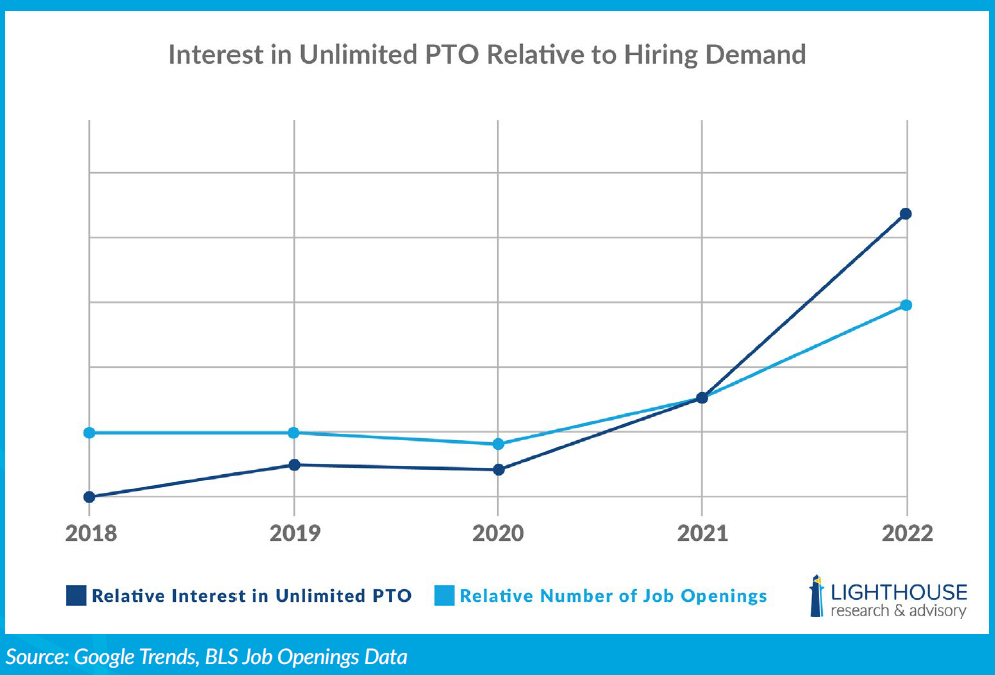Not too far in the past, a company that offered its workers an unfettered amount of paid leave would have seemed illogical at best. After all, the typical method of accruing paid leave over time was commonplace and widely accepted by employers and employees alike. But then a small minority of companies began to offer something that seemed nearly mythical: unlimited paid time off.
The idea was talked about widely but was practiced sparsely. However, in recent history, the interest in the topic has risen sharply due to intense competition and labor shortages.
But in the midst of this, everyone has worked off the assumption that the benefit was primarily meant to attract and retain workers by meeting their needs for a flexible leave benefit. Most
companies that adopt an unlimited leave plan say that employees can take the time off that they need without having to accrue hours each pay period or feel pressured to use leave before it expires.
The intended result: workers can do their best work, but they can also have the time that they deem necessary to spend on family, travel, or other personal pursuits.
But make no mistake, in many cases the decision to adopt unlimited leave plans is for the convenience of the employer. Sure, the promise of unlimited leave is incredibly appealing, but in practice it doesn’t often look like you might expect. In a study of hundreds of employees currently working under an unlimited PTO system, we found that satisfaction with the benefit varies widely. Most importantly, we found a few key shortcomings of unlimited paid time off plans that every employer should know about:
- The potential for bias is even higher than with some other practices like hiring, because who actually checks to see if everyone is getting their fair share of time off?
- Companies that naturally gravitate towards UPTO plans have cultures and work environments that, consciously or unconsciously, discourage workers from taking time away from work.
- Thousands of workers flock to online forums to talk about their experiences. While all of them don’t hate unlimited PTO systems, there’s a staggering number of them that expose the harsh realities of working in a company with one of these “benefits.”
- Getting unlimited PTO right requires a near perfect alignment of multiple variables, from manager education and worker communications to executive support and more. It’s not as simple as flipping a switch and making it available.
What’s most surprising to me is that if you search online, there are tons of anecdotal stories and examples of how UPTO approaches can be harmful, but until now nobody has actually done research to understand the impacts on the workforce.
As a former HR executive, I am dismayed that so many companies have jumped into unlimited PTO plans without stopping to consider the potential consequences on the very workers they are meant to serve. It’s my hope that this research will help us as a community of People leaders to make decisions going forward that benefit the entire workforce, not just a few of them.
We’re making the report freely available if you want to understand more about unlimited paid leave, the hottest “benefit” that may not benefit the workforce at all.

Ben Eubanks is the Chief Research Officer at Lighthouse Research & Advisory. He is an author, speaker, and researcher with a passion for telling stories and making complex topics easy to understand.
His latest book Talent Scarcity answers the question every business leader has asked in recent years: “Where are all the people, and how do we get them back to work?” It shares practical and strategic recruiting and retention ideas and case studies for every employer.
His first book, Artificial Intelligence for HR, is the world’s most-cited resource on AI applications for hiring, development, and employee experience.
Ben has more than 10 years of experience both as an HR/recruiting executive as well as a researcher on workplace topics. His work is practical, relevant, and valued by practitioners from F100 firms to SMB organizations across the globe.
He has spoken to tens of thousands of HR professionals across the globe and enjoys sharing about technology, talent practices, and more. His speaking credits include the SHRM Annual Conference, Seminarium International, PeopleMatters Dubai and India, and over 100 other notable events.

